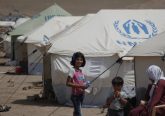
Dr Hugo Slim is a Senior Research Fellow at the Institute of Ethics, Law and Armed Conflict at the University of Oxford, and a Board Member of the Catholic Agency for Overseas Development (CAFOD).
It feels wrong to watch the news about Syria and the Central African Republic night after night without seeing any effective international action being taken to stop the killing, displacement and rape. After millions of civilians were killed in the Second World War, the United Nations was set up specifically “to save succeeding generations from the scourge of war”. So why doesn’t it?
International politics are especially frustrating. We tend to wish they were just like the domestic politics of a rich western democracy, but they are not. There is no generally accepted global government and no international police force that can respond fast and effectively to atrocities and bring perpetrators to justice.
Instead, the fifteen members of the UN Security Council have the responsibility to “ensure international peace and security”. But, as we can see in Syria, they all need to agree before they can act, especially the permanent five members (P5) who can veto any resolution put before them. Sometimes, as in violent conflicts in Sierra Leone, Kenya, Libya, and Cote d’Ivoire, they do agree and help to stop the killing. But on conflicts like Syria, Sri Lanka and Sudan, they do not.
It is all deeply tragic, and we might well feel right to be very pessimistic about the politics of civilian protection. In fact, there has been rather exceptional progress in international efforts to prevent atrocities against civilians in recent years. Counter-intuitively perhaps, we are living in a moment of unusual hope.
The challenge of preventing atrocities against civilians is, above all, the difficulty of protecting the interests of the individual in a world dominated by the interests of states. Unless these two sets of interests can be permanently aligned in global society, there will continue to be a sort of global postcode lottery that determines the protection you get as a civilian. If you are in Cote d’Ivoire you are lucky, in Syria unlucky.
This tension between the rights of the individual and the rights of the state are written into the very texture of the UN Charter of 1945. While this pioneering document recognizes “fundamental human rights, and the dignity and worth of the human person” in its Preamble, Article 2(7) contains the so-called non-interference clause. This states categorically that: “nothing contained in the present Charter shall authorize the United Nations to intervene in matters which are essentially within the domestic jurisdiction of any state.” All too often, dictatorial states have considered mass murder to be one such domestic matter.
So how has there been progress? The answer is that international consensus on “non-interference” has been changing. In a landmark document in 1992 called An Agenda for Peace, the then UN Secretary General, Boutros Boutros Ghali, declared that “the time of absolute sovereignty has passed”. In other words, states could not simply do what they liked and kill their people at will.
The only exception to the non-interference principle in the Charter is in Chapter VII. This entitles the UN Security Council to use coercive measures of economic and military force “to maintain or restore international peace and security”. So, using Chapter VII and if everyone in the Council agrees, the UN can go to war itself. Gradually, during the 1990s, the Security Council began to use Chapter VII much more to impose economic sanctions, arms embargoes, and to deploy large peacekeeping forces and even military attacks in many civil wars.
After the UN’s massive failure to intervene and stop the Rwandan genocide in 1994, there was a new wave of momentum in global NGOs and states to establish some principle of international intervention and to bring perpetrators to justice. In 1998, a statute for a new International Criminal Court (ICC) was agreed in Rome. The Court came into effect in 2002 with a mandate to try individuals for four big crimes: genocide; crimes against humanity; war crimes, and the crime of aggression. Since then, individual soldiers, politicians, and heads of state (including Charles Taylor of Liberia and Slobodan Milosevic of Serbia) have been tried and convicted by the Court.
The ICC represents extraordinary progress in delivering justice after atrocity. The new international doctrine of the “responsibility to protect” (R2P) was developed and then endorsed by the United Nations in 2005 with a more proactive intent. R2P sets out to protect civilians by preventing atrocities before they take place. Although a new form of words, R2P runs into the same old difficulties of implementation as the earlier idea of “humanitarian intervention”. However, using a mixture of traditional Just War theory and the big four crimes, R2P has, at least, spelt out a threshold for international action.
R2P affirms that every state has the responsibility to protect its citizens from genocide, crimes against humanity, ethnic cleansing and war crimes. When a state will not or cannot protect its population, then the international community can act by helping to reduce tensions or militarily intervening to prevent atrocities. So, state sovereignty is no longer supreme.
But the UN and others must act cautiously in any intervention. R2P insists that there must be a just cause, a right intention, reasonable prospects of success, and legitimate authority in any intervention. The means of intervention must also be proportionate to the threat and respectful of human rights and the laws of war.
So we can talk of limited success in developing new norms and practices of civilian protection, and we can celebrate a new international court for such atrocities. But political difficulties continue in the UN Security Council where prudence, feasibility, self-interest and alliances still rule. Member states will only really vote for intervention if it is practically achievable and does not risk escalating an even greater conflict, and if it does not upset their allies or threaten their economic interests. New principles of protection still rub up against old principles of realpolitik.
In the meantime, the significant expansion of humanitarian aid in recent years is another sign of very practical progress in civilian protection. While we watch hundreds of people being hurt and killed on the news, these agencies and their many national staff are saving hundreds of thousands of people every day and helping them to stay alive.
Even if you despair of international politics, do not despair of agencies like the Red Cross and Red Crescent, Caritas, Oxfam and Islamic Relief who work every day to protect civilians in their homes or wherever they have fled. These agencies have an impact.
Further Reading:
Hugo Slim, Killing Civilians: Method, Madness and Morality in War, Hurst, London 2007.
Alex Bellamy, Global Politics and the Responsibility to Protect: From Words to Deeds, Routledge, London, 2010.






1 Comment